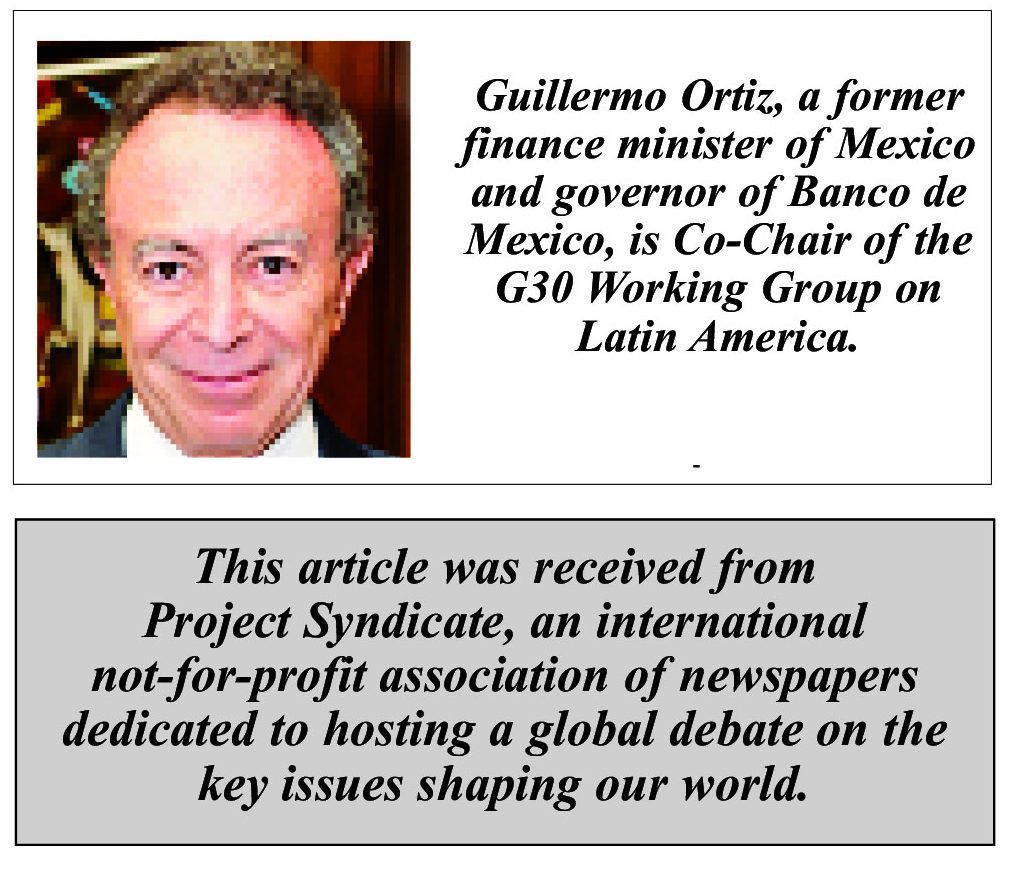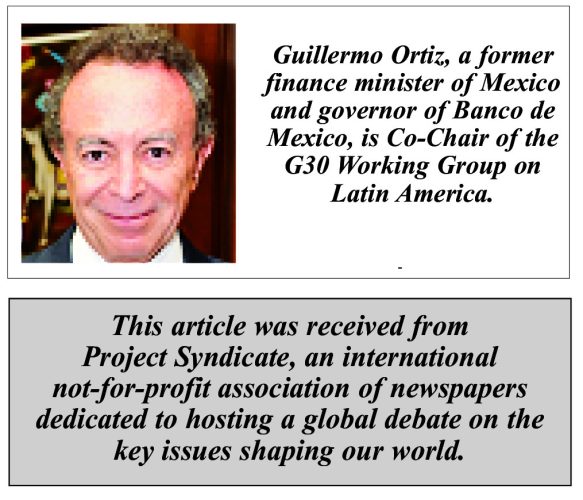MEXICO CITY – After winning the US presidential election last month, it did not take Donald Trump very long to announce that he will impose import tariffs of 25% on all goods from Mexico and Canada, as well as adding ten percentage points to all existing tariffs on goods from China. While the stated objective is to force these countries to block the flow of illegal migration and/or fentanyl from their territory into the United States, the policy neatly folds Trump’s favorite topics – immigration, crime, and tariffs – into one package.
The response was predictable. Mexico warns that tariffs would be severely disruptive and inflationary. While it has offered cooperation to allay US concerns, it is also prepared to retaliate if Trump follows through. And some in Canada have suggested a separate agreement, arguing that Mexico is becoming a platform for Chinese exports to the US.
Mexico has been widely seen as vulnerable to Trump’s policy agenda. So far, though, the market seems to be assigning a low probability to the imposition of tariffs, perhaps betting that the US will not risk an extraordinarily disruptive unraveling of the United States-Mexico-Canada Agreement (USMCA, the follow-on to the North American Free Trade Agreement). The exchange rate has depreciated by only around 1.7% since Trump’s announcement, and the spread on Mexican bonds has barely widened.
The reaction to Trump’s previous tariff threats in 2019 was far more dramatic. On that occasion, he threatened to impose staggered tariffs beginning at 5% and going up to 25% to force Mexico’s then-president, Andrés Manuel López Obrador (widely known as AMLO), to stem the flow of migrants coming from Central and South America. AMLO responded by deploying the national guard to Mexico’s southern border, before eventually establishing a working relationship – and even some affinity – with Trump.
But AMLO is gone, and President Claudia Sheinbaum’s new administration has been in office for less than three months. Her first 100 days coincided with one of the worst outbreaks of violence by organized-crime groups in recent memory. Following the arrest of a prominent cartel leader, a turf war among rivals has claimed thousands of lives – including the mayor of a state capital and a priest.
Sheinbaum inherited this situation from AMLO, whose security policies were disastrous. Despite overseeing the increased militarization of the country, his administration avoided direct confrontation with the cartels. That strategy has clearly failed (drawing harsh, albeit belated, criticism from the US government), and now Sheinbaum’s administration has stepped up the pressure with a more coherent policy based on increased intelligence sharing and cooperation with local authorities.
This is an area of common interest for the US and Mexico. Sheinbaum and Trump have an opportunity to restore their countries’ intelligence sharing and law-enforcement cooperation, which fell into abeyance under AMLO. They could start by introducing stronger controls to impede weapons sales to drug cartels by US dealers, which supply an estimated 70% of the cartels’ armories.
While US weapons manufacturers have successfully lobbied against restrictions on such sales, depriving the cartels of arms would be hugely beneficial to both Mexico and the US, not least by drastically curtailing fentanyl production and exports northward. Moreover, as in 2019, Mexico could reinforce border controls to stem the flow of migrants, whose numbers have already declined substantially this year.
Any renegotiation of the USMCA would probably focus on the same issues as the NAFTA revision during Trump’s first term: auto industry “regional value content,” wages in Mexico, and various measures to discourage relocation of manufacturing from the US. This is to be expected. Yet there is another demand that Mexicans should welcome, because it could strengthen the rule of law within our own borders.
Mexico’s constitution was recently modified to enshrine AMLO’s judicial reforms, which introduced elections for Supreme Court justices and federal judges. The US and Canada have both voiced concerns about this change, warning that it could pave the way for autocratic one-party rule. And another AMLO-era constitutional initiative, aimed at eliminating autonomous regulatory entities, may be in violation of both the letter and the spirit of the USMCA.
Of course, Trump may not care about the erosion of democracy in Mexico. But his nominee to serve as Secretary of State, Marco Rubio, was an open and frequent critic of AMLO, whom he accused of capitulating to drug cartels and supporting authoritarian regimes in Cuba, Venezuela, and Nicaragua. Moreover, these are authoritarian regimes that even Trump dislikes.
Thus, a USMCA renegotiation could be a useful instrument to restore some of Mexico’s damaged institutions and prevent AMLO’s party, Morena, from ramming through other pending reforms. Better yet, US pressure could accentuate the divisions within Morena, weakening support for the former president and giving Sheinbaum more room to maneuver. The erosion of Mexico’s democracy probably cannot be stopped by a quasi-legal framework “imported” through ratification of a revised trade agreement. But bringing the split within Morena to a head certainly wouldn’t hurt.
The quicker that AMLO’s shadow recedes, the sooner we will know which Sheinbaum will govern Mexico. So far, she has mostly followed AMLO’s playbook, but she has also sought to build bridges with the private sector to attract investment in clean energy and logistics. She wants to seize the opportunities offered by the US emphasis on nearshoring its supply chains, but such efforts have stalled as a result of Mexico’s institutional deterioration.
Copyright: Project Syndicate, 2024.










